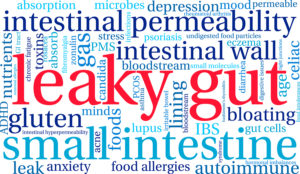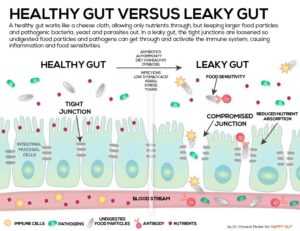While the medical community does not recognize a leaky gut as a major contributing factor to all sorts  of health issues, there is a growing body of science showing how a leaky gut, or what is called intestinal permeability, is wreaking havoc on people’s health.
of health issues, there is a growing body of science showing how a leaky gut, or what is called intestinal permeability, is wreaking havoc on people’s health.
This health concern is not new.
In fact, Hippocrates recognized it when he stated,
“All Disease Begins In The Gut.”
Ideally, your intestine is designed to be a very selective barrier to everything you consume. It does this by creating what are known as “tight junctions.” As you can see in the below image created by Dr. Vincent Pedre for Happy Gut, these tight junctions are loosened so that undigested food particles, toxins, and pathogens can enter your blood stream.

Image from: http://www.happygutlife.com/2015/10/14/leaky-gut-what-is-it/
The result is an immediate activation of your immune system causing inflammation and food sensitivities.
How Can You Tell If You Have a Leaky Gut
While not everyone has a leaky gut, the following checklist will help you understand your increased probability for this issue. There are two columns: Triggers and Symptoms. The more you check off, the more likely you are to have some level of leaky gut.
|
Triggers |
Symptoms |
|
___ Dietary Protein Especially Dairy and Meat |
___ Bloating |
|
___ Infections |
___ Food Allergies |
|
___ Use of Antibiotics |
___ Food Sensitivities |
|
___ Sugar Consumption |
___ Headaches |
|
___ Low Stomach Acid and Enzymes |
___ Joint Pain |
|
___ Stress |
___ Low Energy and/or Fatigue |
|
___ Pregnancy |
___ Thyroid Condition |
|
___ Menopause |
___ Digestive Issues |
|
___ Toxins |
___ Weight Gain |
|
___ Poor Diet |
___ Mood Issues |
|
___ Processed Foods |
___ Skin Issues like Rosacea and Acne |
|
___ Bacterial Imbalance |
|
|
___ Lectin Consumption |
|
|
___ Alcohol Consumption |
3 Triggers That Contribute To A Leaky Gut
While most people think they eat “good” food, let’s identify three triggers from above that most people consume and how they can contribute to a leaky gut.
Lectins – Lectins are sugar-binding proteins used by plants as a natural defense system to protect themselves from mold and parasites. And while they protect plants, they damage your intestinal lining.
The reason why is your digestive lining is covered with sugar-containing cells that help break down your food. These lectins will attach themselves to your digestive lining causing inflammation that ends up damaging your gut.
And while there are a wide variety of foods that contain lectins, these 4 will have the greatest impact:
Wheat, Legumes (especially kidney beans), Peanuts, and Soy.
Source: https://www.danhammerhealth.com/turbo-charge-energy-eliminate-lectins
Dairy Protein – Conventional cow’s milk contains the protein A1 casein which is harmful to your gut. This is especially true if you’re drinking pasteurized milk which destroys vital enzymes that are needed to help you digest sugars like lactose.
The best alternative to dairy is to replace it with Almond Milk, preferably 30 calories without any sugar added to it.
Sugar – Outside of wheat, this is the number one contributor to poor digestive health.
And the reason why is that sugar feeds yeast, candida, and bad bacteria. All of which can create toxins that damage the lining of your intestine. As well as eat holes in your intestinal wall leading to a leaky gut.
And the greater the dysbiosis of your abdominal cavity the greater your potential for a leaky gut.
So how do you correct this dysbiosis and potential for a leaky gut?
Our next two blog articles will help you identify the fastest way to bring your gut flora back into balance, and aid in the repair of the lining of your small intestine.
Leave a Reply
You must be logged in to post a comment.